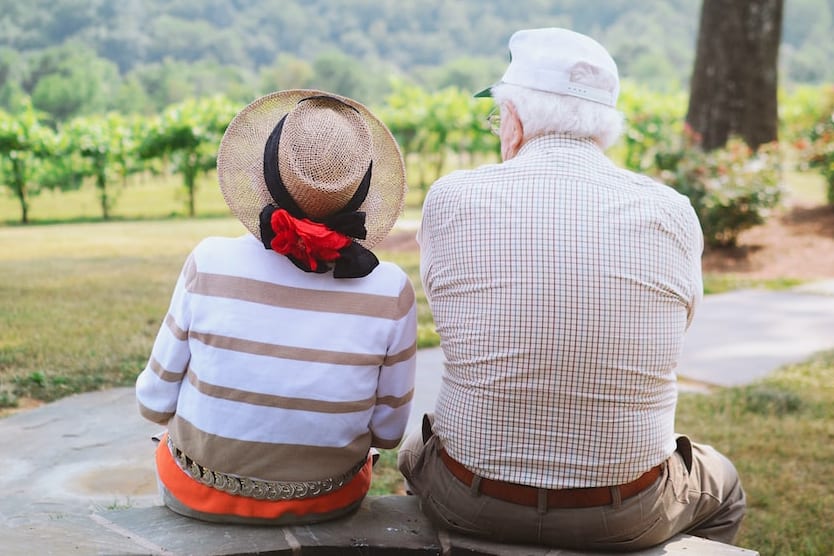Over 60% of the approximately 12,000 people who die each year in the United States from heat-related causes are older than 60 years of age. Are you worried about the impact of heat on an elderly friend or relative? Senior living can help. Seniors are especially vulnerable to extreme temperatures. Their bodies aren’t always able to keep up with fluctuations. Heat can cause dehydration, exhaustion, headaches, body aches, and more. But there are ways you can help seniors stay safe and cool during hot weather periods.
Knowing how to prepare for dealing with heat is key to staying healthy this season. In a senior living community, various strategies are in place aimed at keeping seniors cool and in the best health. The summer months can mean senior health is compromised. Here are some strategies for dealing with heat and reducing its impact on your loved ones.
Risks to Seniors in the Summer Months
The summer months can pose many risks to seniors that can be difficult for them to manage without help. Heat exhaustion is one of the most common problems that seniors experience when exposed to extreme temperatures. Symptoms of heat exhaustion include dizziness, headaches, nausea, and lack of energy. If left untreated, it can lead to dehydration and even heat stroke, which can be fatal.
Why Are Seniors More Vulnerable to Extreme Heat?
Seniors are particularly vulnerable to extreme heat due to a variety of factors. As people age, their bodies become less able to regulate temperature and they may not be aware that the environment is too hot.
Some medications seniors take can interfere with sweat production, which makes it more difficult for them to cool off in hot weather.
Other issues such as chronic illnesses or limited mobility can also make it harder for seniors to stay out of the sun or find relief from the heat. These issues can be solved in an assisted living community.
How to Deal With Summer Heat
To protect elderly individuals from heat-related illnesses, it’s crucial to learn how to prevent and manage these issues. Here are our top tips for dealing with hot weather safety.
Stay Hydrated
Keeping seniors hydrated is critical in the summer months. Encourage them to drink plenty of fluids and stay away from caffeinated or alcoholic beverages. It’s also a good idea to keep water bottles handy when spending time outdoors in the heat and make sure they are drinking enough throughout the day.
Eat Light Meals and Cooling Snacks
Stick to light meals and cooling snacks like cucumbers and melon in hot weather. Avoid heavy foods that are high in fat or protein as they can make it harder for the body to cool down. Homemade popsicles are a great way to cool elderly people down as well as help keep them hydrated.
Wear Appropriate Clothing
Make sure elderly individuals are wearing light, breathable clothing in the summer months. It’s also important to provide them with plenty of shady areas when they’re outside. A wide-brimmed hat or umbrella can provide extra protection from the sun’s rays. Don’t forget to apply sunscreen to exposed skin, as well as use sunglasses to protect your eyes.
Use Damp Towels
Applying cool or damp towels to a person’s neck, wrists and forehead can help lower their body temperature. It’s also beneficial to keep the windows open and use fans or air conditioning when possible.
Use a Cool Water Foot Soak
If seniors are feeling too hot, try a cool water foot soak. This can help reduce their body temperature by cooling the blood to their feet.
Limit Time Outdoors
This is especially important for elderly individuals who live in areas that tend to have extremely hot summer temperatures. It’s still important for them to get daily fresh air and exercise, but encourage them to do this in the cooler hours of the day such as early morning, or later in the evening.
Monitor Medications
Some medications, such as beta-blockers and diuretics, can make seniors more prone to heat exhaustion. It’s important to monitor their medications and ask their doctor or pharmacist about any potential side effects that could heighten the risk of heat-related illnesses.
Keep the Home Cool
Keeping windows and blinds closed during the day will help keep hot air from entering the home. If possible, open windows at night when temperatures are cooler and close them in the morning before temperatures rise. The use of ceiling fans or portable fans can also help circulate air in the home and increase air circulation.
Seek Medical Help Immediately
It’s a good idea to check in with elderly individuals regularly throughout hot weather and make sure they are doing alright. If an elderly individual is showing signs of a heat-related illness, seek medical help immediately. Symptoms include dizziness, nausea, headaches, and confusion. Heat stroke can be life-threatening, so it’s important to take any symptoms seriously and get help right away.
Consider Senior Living
Assisted living can be an excellent option for elderly people who struggle to stay cool during hot weather. Senior living communities are designed with many features that make them an ideal choice for older adults. This includes air-conditioned homes and regularly scheduled activities that take place in a climate-controlled environment. In addition, senior living facilities usually have staff members available to provide support and assistance whenever needed.
Need Help Keeping a Senior Relative Cool This Summer?
In the summer months, it’s especially important to check in on elderly individuals and make sure they are staying cool. By using the advice we’ve given in this article, you can help your elderly relative stay in the best health this summer.
If you need additional assistance, consider senior living communities like Inspired Living. Our staff members provide support and assistance whenever needed. We offer air-conditioned homes within climate-controlled environments. Visit our website today or book a tour at one of our assisted living and memory care communities now!




